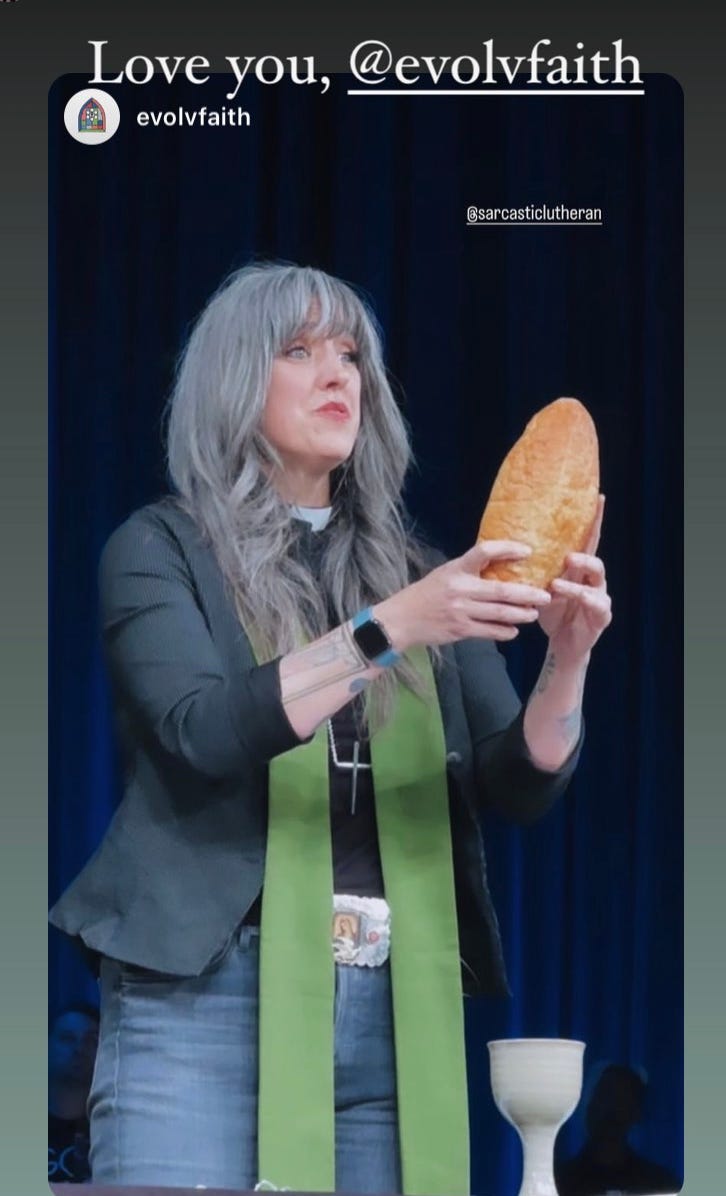God Doesn't Have a Fragile Ego
Evolving Faith
In 2018 two of my friends, Rachel Held Evans, and Sarah Bessey started Evolving Faith, a conference for those in the wilderness of faith; questioners, and post-Evangelicals and those for whom no convenient term applies.
The next Spring, on the night our beloved friend Rachel died, Sarah and I (as well as our friends Jeff Chu and Matthew Paul Turner) gathered around her hospital bed. We touched her face, and sang a hymn and prayed and mostly just stood together in the unspeakable sadness of it all.
(If you’d like to read more about that, click here:)
Later that same year, Jeff stepped in to work alongside Sarah help make sure that the Evolving Faith conference could still happen even if we were all crushed to pieces by the grief of losing Rachel.
I was honored to preach that year and honored again to stand in the pulpit yesterday for Evolving faith’s 6th conference.
Below is the sermon.
(and here is the sermon I preached at our friend Rachel’s funeral)
An Evolving Faith Sermon on The Parable of the Wedding Feast. ←click to read Matthew 22
In most of the preaching I heard growing up, parables were turned into something very small and sturdy - preferably with a moral lesson tacked onto the end – but trying to nail down the meaning of a parable is like trying to nail down jello to a tree.
Because what makes Jesus’ parables so powerful isn’t that they are timeless lessons in morality, but that they are endless sources of meaning. And that meaning is found when we read his parables in the context of our own lives.
But that felt rough for me this week, because here’s how I heard this parable:
A king throws a wedding banquet and invites the other rich, powerful people. And when they blew off the invitation, it bruised the fragile ego of the king. So he sent some slaves to mention what was for dinner, and when his peers were seemingly unimpressed by the veal cutlet, they laughed and proceed to kill the slaves of the king. But the king refuses to admit defeat and sends his soldiers to kill them back. But he doesn’t stop there, not to be outdone, the king burns down the entire city. The entire city.
The insecure king refuses to admit defeat, so he calls the secretary of state in Georgia and says find me 11,000 RSVPS . . .no, sorry, I mean the king sends more of his slaves to find whoever they can to fill the seats for his stupid banquet. Mainly so he can brag about the huge crowds who showed up to see him.
But who exactly is left to stroke his ego now? It’s the folks wandering the streets, picking apart the charred debris of their burned city who are then told that they have no choice but to go to the party of the guy responsible. And it’s already been established that he doesn’t respond well if you insult him.
So, out of fear they all dutifully put on the wedding robes given them at the door and they try to pretend their host didn't just burn their city down.
Well, our story ends with the King noticing the one dude not playing along – the one guy not wearing a wedding robe. And when this brave, innocent man has nothing to say for himself, the king has him hogtied and thrown into the outer darkness. Wailing gnashing of teeth, etc.
Suck it up, dude…Many are called but few are chosen he says.
So there you go. A Nadia International Version of a parable about how God is like a violent man with a fragile ego and unlimited power.
This is the kind of thing that makes me and many other preachers ask the question: Why in the world do we assume that the ruler, the slave owner, or the tyrant in the story always represents God?
Well maybe because when people are told that God is a capricious, angry bastard with a killer surveillance system who’s always angry at you for doing the “wrong thing” then it’s easier to control their behavior. So here are some terrifying stories about what God does if you do not follow all their rules. By the way, God loves you very much. (but that can change at any minute).
If this sounds familiar, it is because a lot of us have had scripture weaponized against us in just these ways. This very parable has a vicious history of anti-Jewish interpretations. And given all that, we may be tempted to walk away from the Bible altogether and I understand why, I do, but I beg you to reconsider. Because as I’ve said before, scripture and theology are too potent to be left in the hand of those who only use them to justify their dominance over another group of people. We cannot cede our scriptures to them.
Because Christianity is not supposed to be about feeding anyone’s ego or a lifestyle in which we can know who we are better than. Christianity is not supposed to be about controlling the masses. Christianity is supposed to be about raising the dead.
So, beloveds, what if the kingdom of heaven isn’t like a bullying-king what if the kingdom of heaven is like the guy who refuses to play along? What if the kingdom of heaven is like someone who shows up and says no to empire. What if the Kingdom of heaven is like the one who stands speechless before his accusers refusing to dignify taunts with a reply, … What if the kingdom of heaven is like someone who is hog tied for not participating in victimizing the weak (or for not self-protectively piling onto someone when we sniff out a mistake they made years ago). What if the kingdom of heaven is like someone who is thrown by the empire into the outer-darkness . . . and what if the name of that outer darkness is Calvary?
What if the name of that outer darkness is Calvary.
Because if there is a king in this Gospel that looks anything like the God that we gather to worship, it looks like Christ the King; the one who came not to be served, but to serve and to offer his life for the world.
At Calvary he enters the outer darkness of empire, the outer darkness of our self-obsessions, the outer darkness of our secret addictions, the outer darkness of our sins and sorrows, the outer darkness of our human competition extravaganza. He goes to Calvary, rather than play along.
He refuses to play. And instead goes willingly to the outer darkness because that’s where this game always ends.
And from Calvary he forgives it all - because in his kingdom there is simply nothing to win at.
Which means when he said the first shall be last and the last shall be first he didn't mean a single iteration and then stop. I seriously doubt that Jesus was saying “if you have been hurt by the strong, in my kingdom you will be the ones who get to do the hurting” He was saying that’s how the kingdoms of this WORLD work; Regime change, hostile takeovers, aggressive divorce attorneys, making a name for yourself by tearing down the work of another, gossiping about others in order to feel superior. There are countless ways to exert dominance in the arena of human striving.
Like when someone has hurt me, my ego tells me to seek retribution - to metaphorically burn down their city so to speak, or at the very least, cling to my resentment like it’s currency. But resentment and retribution have never managed to eliminate the shame of having been hurt, or the shame of having been betrayed in the way I think they will. Only forgiveness can do that. And my ego just hates that idea.
But here’s how we know Jesus does not play these same games we do, because Jesus could have won the battle and the war and all the cash and prizes and yet, as Philippians 2 states,
though he was in the form of God,
he did not regard equality with God
as something to be exploited,
but emptied himself,
taking the form of a slave,
being born in human likeness.
And being found in human form,
he humbled himself
and became obedient to the point of death—
even death on a cross.
Which means The Lord's Prayer which we are about to say, and which has been spoken every single day since our Lord taught it to the first of his faltering friends, just might be the most subversive of all declarations: "Thy kingdom come, thy will be done, on earth as it is in heaven." Because we who live and pray this way have a very different agenda than the kingdom of this world, we have pledged our allegiance and submitted to the reign of the unresentful loser, The one who was cast out, The prince of peace.
Whose judgement is one of forgiveness and mercy…A servant King. A crucified enemy-loving King. Under whose wounded feet all notions of supremacy are crushed.
To be a citizen of his kingdom is to have an identity and a value and a peace that is un-threaten-able. There’s nothing to earn. No extra credit to be had. No dominance to exert.
Friends, I believe that softly and tenderly Jesus is calling us home to HIS kingdom.
Calling us to slough off the grotesque garments of Caesar’s regime.
Calling us to the truth of what actually matters.
Calling us to sweet forgiveness.
Calling us back from the outer darkness of every false empire and into the very heart of God.
Calling us… to come home.
Amen.
As always, if you’d like all the benefits of a paid subscription (being able to comment and respond to all my posts, special subscriber essays, my weird little “Stuff I’m Into” posts…) but paying isn’t for you, just shoot us a request at shamelessmediallc@gmail.com and we will hook you up for free!
Check out their Substacks:





As a Catholic clergy and “preacher” I struggled so much with this scripture. Thanks for a reflection that speaks to the true God we believe in. “When you fire are the other gods, the God of love remains.”
Beautifully expressed as ever, Nadia. I love how you make the point that "Because Christianity is not supposed to be about feeding anyone’s ego or a lifestyle in which we can know who we are better than. Christianity is not supposed to be about controlling the masses." There's such a fundamental disconnect in the world between what Christianity (or any faith really) SHOULD be and what too many people decide it is. And that to me is a humanity problem, not a faith problem.